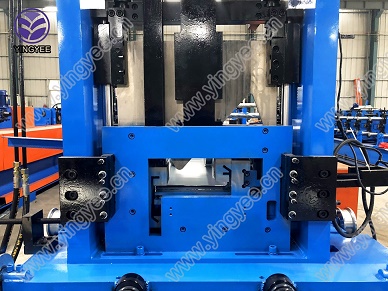
The Benefits and Applications of C-Shaped Steel Roll Forming Machines
In the realm of metalworking and construction, efficiency and precision are paramount. One of the most innovative solutions that address these needs is the C-shaped steel roll forming machine. This advanced equipment has revolutionized the production of C-shaped steel sections, commonly utilized in various industries, including construction, manufacturing, and automotive. This article explores the importance, functionality, benefits, and applications of C-shaped steel roll forming machines, highlighting why they have become essential tools in modern metal fabrication.
What is a C-Shaped Steel Roll Forming Machine?
A C-shaped steel roll forming machine is designed to create C-section steel profiles through a continuous forming process. The machine takes flat steel strips and progressively bends them into a C-shape using a series of precisely arranged rollers. This automation enhances the efficiency of manufacturing steel components, ensuring uniformity in size and shape. The process is not only faster than traditional methods but also reduces material waste, making it an environmentally friendly option in metalworking.
Key Advantages of C-Shaped Steel Roll Forming Machines
1. High Efficiency C-shaped steel roll forming machines can produce large quantities of steel profiles quickly. This speed is crucial in industries where time-to-market is a competitive factor. Automated systems can run continuously, minimizing downtime and maximizing output.
2. Consistency and Precision One of the standout features of these machines is their ability to produce consistent and precise steel sections. The automated roller system ensures that each piece produced meets the exact specifications required, reducing the risk of human error inherent in manual processes.
3. Material Efficiency The roll forming process minimizes scrap material compared to traditional cutting methods. With improved material utilization, manufacturers can lower production costs, thus increasing profit margins.
4. Versatility C-shaped steel profiles are widely used in construction for framing, brackets, and various structural applications. The versatility of the roll forming machine allows for modifications to produce different sizes and thicknesses of C-sections to suit diverse project requirements.
5. Durability and Strength Steel sections produced by roll forming are renowned for their strength and durability. C-shaped steel profiles are particularly favored for their ability to bear loads and provide structural support, making them ideal for use in commercial and industrial construction.

Applications of C-Shaped Steel Profiles
The applications of C-shaped steel profiles are extensive, ranging from simple structures to complex projects. Here are some of the primary uses
1. Construction C-sections are commonly used in the framework of buildings, providing essential support for walls, roofs, and floors. Their strength makes them ideal for both residential and commercial building projects.
2. Manufacturing Various manufacturing setups utilize C-shaped steel for conveyor systems, racks, and supports. The ability to customize sizes allows manufacturers to incorporate these profiles seamlessly into their operations.
3. Automotive In the automotive industry, C-shaped profiles are often used in the production of frames and structural components. Their strength-to-weight ratio provides necessary support without adding excessive weight to vehicles.
4. Agriculture C-shaped steel is often used in agricultural structures like barns and greenhouses, where they support roofs and walls efficiently.
5. Telecommunications Towers and poles used for communication systems often incorporate C-shaped profiles, providing a sturdy framework to support antennas and other equipment.
Conclusion
C-shaped steel roll forming machines represent a pinnacle of modern manufacturing technology, providing unprecedented efficiency and precision in the production of steel sections. The advantages of using these machines extend beyond just speed; they promote material conservation, enhance product consistency, and serve a wide array of applications across multiple industries. As the demand for durable and reliable steel components continues to grow, so does the importance of C-shaped steel roll forming machines, establishing themselves as indispensable tools in the contemporary construction and manufacturing landscape. Embracing this technology not only enhances operational capabilities but also fosters innovation in design and application across various sectors.